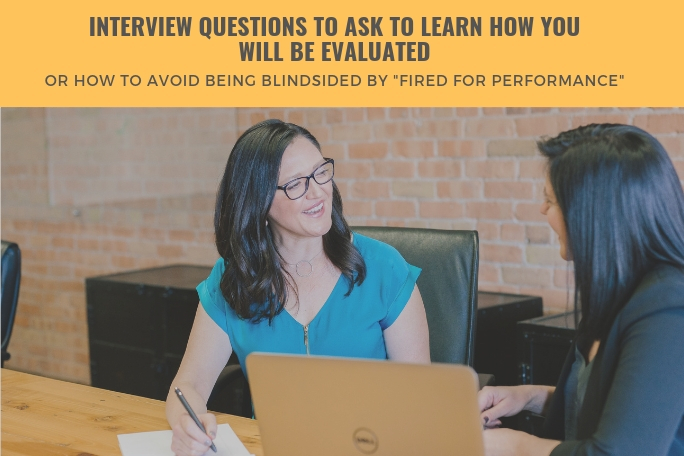
26 Mar Questions to Ask at the End of an Interview
“I was fired for performance. I feel blindsided because I never received a performance review or had previous discussions with my supervisor about my performance. What should I be asking in my upcoming job search to prevent something like this from happening again?”
This was a question asked recently by Linda, a woman in a group I’m in. Many people in the group offered that there could be potential legal action for Linda to take. I’m not an employment attorney, and that’s not an area I have expertise in, so I focused on the root of her question.
“What should I be asking in my upcoming job search to prevent something like this from happening again?”
I can understand where Linda is coming from. She had no knowledge there was a problem with her performance, so therefore, out of the blue it seemed, she was terminated. She was left feeling shocked, confused, upset, disappointed, and perhaps, embarrassed and dejected. No wonder she wants to prevent this from happening again.
While there is no insurance policy that can guarantee Linda’s situation from recurring, there are a few questions I recommended she ¬¬ask in her next round of interviews. Depending upon the answers to these questions, she will have some insight into the company’s review process (if there even is one) and have information to hold the company accountable for providing her the much-needed feedback she lacked at her previous company.
Questions to Ask at the End of an Interview
As Linda got to the final interview stages, I recommended she ask about:
1) The company’s employee review processes and procedures.
What is the company’s formal review process? How often are employees evaluated? Are there quarterly check-ins? When does the formal review occur? What are some of the key performance metrics employees are evaluated on?
2) The immediate manager’s communication and project-review style.
What is your immediate supervisor’s communication style? How do they prefer you communicate with them to be most effective (face-to-face, email, Slack, DM, text, phone, video)? How often will you be asked to meet to review projects? Will you meet with them daily? Weekly? Monthly? As needed?
3) How to earn a “gold star.”
Ask your immediate supervisor how you will “earn a gold star” in the role for which you are interviewing. What are the projects, tasks, attributes you should do/have to make you shine in their eyes? Are there specific tasks or KPIs you will be measured against? What should you do to be successful in the role? How and how often will you do a review with your supervisor to know if you are tracking toward accomplishing that gold star?
I recommend using the questions above to guide the conversation to get answers on the three main categories (formal employee review process, project updates and ongoing communications, and key ways to be successful.) I am not recommending printing them out and going into an interview to check them off one-by-one as you ask each question.
In addition, these questions should be asked at the final stages of the interview process. In the first few interviews, stay focused on letting the perspective employer know why you are the one-and-only perfect candidate for the job. As you get closer to a job offer, shift to understanding the corporate culture and performance review processes and procedures.
With answers to these questions, Linda (and you) can determine if the company she is speaking with is one she wants to join. With an understanding of how Linda’s supervisor will manage her projects and critique her performance, Linda (and you) can determine if this is someone she wants to work for. In addition, Linda (and you) will have all the details on the review process to hold her manager accountable for providing the feedback she was promised, so Linda is not in a position to be blindsided again.
What strategic interview questions have you asked? How did they help you in your career? What interview questions did you wish you would have asked?
